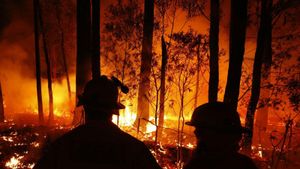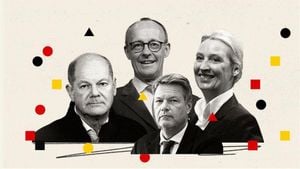The political atmosphere is heating up as Lebanon approaches its presidential election scheduled for 2025, setting the stage for significant changes amid economic turmoil and social unrest.
With presidential elections just over two years away, the political dynamics within Lebanon are becoming increasingly complex. Political analysts are keeping a close eye on how various parties align themselves and how the electorate's mood shifts, especially considering the country's multi-faceted challenges.
Lebanon has been grappling with severe economic woes, manifested through currency devaluation, skyrocketing inflation, and widespread poverty. This precarious situation is forcing political actors to reassess their strategies and approaches as they gear up for potential candidates and platforms.
Political figures have started to position themselves early. Various factions, including traditional powerhouses and new political movements, are vying for prominence. The rise of civil society groups and independent candidates has added another layer of intrigue to the upcoming election, reflecting the citizens' fatigue with the long-standing political elite.
One key player remains the President of the Republic, who, according to the constitution, must be elected to hold office for six years—a position currently held by Michel Aoun. His presidency has been marked by significant challenges, particularly related to the governmental failures seen since the 2019 protests, which were fueled by accusations of corruption and ineffectual governance.
Upcoming discussions and debates will likely focus on significant constitutional reforms—initiatives intended to create greater transparency and accountability within the government, which many citizens see as imperative. There's also talk about the electoral law adjustments due to the recent public demand for change, which could reshape electoral alliances and voter turnout metrics.
For many, the question remains: which candidate will best navigate the turbulent waters of Lebanon’s socio-economic turmoil? The answer could hinge on the ability of candidates to connect with citizens and present viable solutions to pressing issues like unemployment, healthcare, and education.
While major parties like Hezbollah, the Future Movement, and the Progressive Socialist Party will undoubtedly field candidates, smaller parties and independent candidates are carving out spaces for themselves, particularly disenfranchised voters eager for change.
The Sunni political spectrum is particularly pivotal, as it has proven volatile with recent shifts and splits among traditional party lines, perhaps illustrated by the Future Movement's waning popularity. How political leaders align themselves along sectarian lines versus national platforms will be pivotal come election time.
Recently, the political conversation has also included calls for improved international relations and financial aid, especially from Gulf states and Western nations, which could dramatically influence the electoral process and outcomes depending on candidates' stances on foreign policy issues.
Importantly, Lebanon's diaspora will play a significant role on the electoral front. Voters abroad, whose numbers have swelled due to the economic crisis, are set to have their say through absentee ballots. This demographic's priorities may differ from those residing within Lebanon, creating another layer of complexity to the elections.
Observers caution against underestimations of voter engagement, noting the growing sentiment for reforms within Lebanese society. The upcoming elections could usher more progressive policies, especially if public protests persist and the electorate remains mobilized.
With all eyes on 2025, political commentators assert the necessity for campaigns to not only critique the current administration but also actively propose comprehensive plans addressing the myriad crises plaguing Lebanon.
Political parties will need to present candidates who resonate with the public's needs and grievances, making strides toward restoring trust and fostering more transparent governance as Lebanon embarks on this consequential electoral period.



